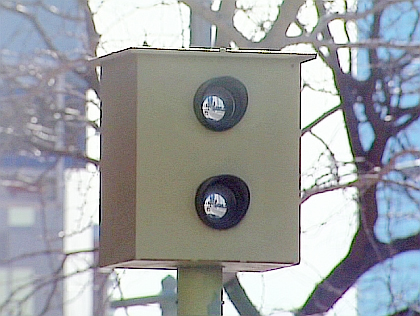A Queens man charged with torching multiple traffic cameras is being held without bail after a federal judge sided with federal prosecutors who claimed the alleged arsonist was a threat to cause greater violence because he praised a mass murder in a notebook that also featured plans to assemble an AR-15.
Elijah Song, a 27-year-old Flushing resident, was arrested on Monday morning and charged with arson of a DOT traffic enforcement camera — though authorities say he set fire to 17 of the life-saving traffic enforcement devices between March and July in northeast Queens.
The criminal complaint reads like a crime novel written by a placard abuse watchdog: According to authorities, Song was seen on surveillance cameras setting fire to traffic cameras — and by an NYPD officer as he tried to torch a camera on Northern Boulevard and Douglaston Parkway just after midnight on July 18. The officer chased Song through a cemetery, but lost him. Firefighters at Engine 313 ended up getting involved because Song parked his Toyota Camry in an "FDNY-only" zone near the fire station.
Naturally, the smokeaters called police ... to get rid of the car. (Parking ticket nerds will recall that this is how detectives finally captured David Berkowitz, the infamous Son of Sam killer in 1977.)
A subsequent search of the car revealed eight gallons of gas in four cans, a metal plate used to protect electrical equipment in DOT traffic cameras and numerous bills and other mail with Song's name on them, authorities say. Prosecutors also allege that the car contained anti-Semitic fliers and a notebook in which Song jotted down plans to build an AR-15 rifle, plus praise for Breton Tarrant, the New Zealand mass killer who murdered 51 Muslims in two mosques in Christchurch in 2019.
"I would love to kill me a whole bunch of those fuckers, just like the New Zealand shooter who killed 50 of them," read one of the notes in Song's car, prosecutors allege.
The car with all of this allegedly damning information is registered to Song's mother and has two speeding camera violations against it, authorities said. Both of the tickets were allegedly issued when Song was driving the car, the criminal complaint alleges.
At the preliminary hearing, Song's lawyer, Nicholas Ramcharitar argued that Song should be released to the custody of his mother's home and affixed with a GPS monitor because the licensed pharmacist is "an upstanding member of the community prior to these allegations."
But Magistrate Judge Steven Gold sided with Assistant U.S. Attorney Andrew Wenzel, who said Song's dream of committing mass murder "would not be solved by an ankle monitor." Gold said that the charges against Song were "disturbing" considering the unused gallons of gasoline and notebook, and ordered him held through the pre-trial period.
Federal authorities said in the criminal complaint that they were authorized to take over the garden-variety arson case because the feds can charge anyone who tries to burn "any building, vehicle, or other real and personal property owned or possessed by ... any institution or organization receiving federal financial assistance, to wit: a New York City Department of Transportation traffic enforcement camera."
Federal prosecutors and law enforcement authorities are currently being criticized for big-footing local authorities under the guise of protecting federally funded resources — a rationale that Attorney General William Barr recently gave in congressional testimony in defense of the deployment of federal troops in Portland to protect a federal courthouse.






